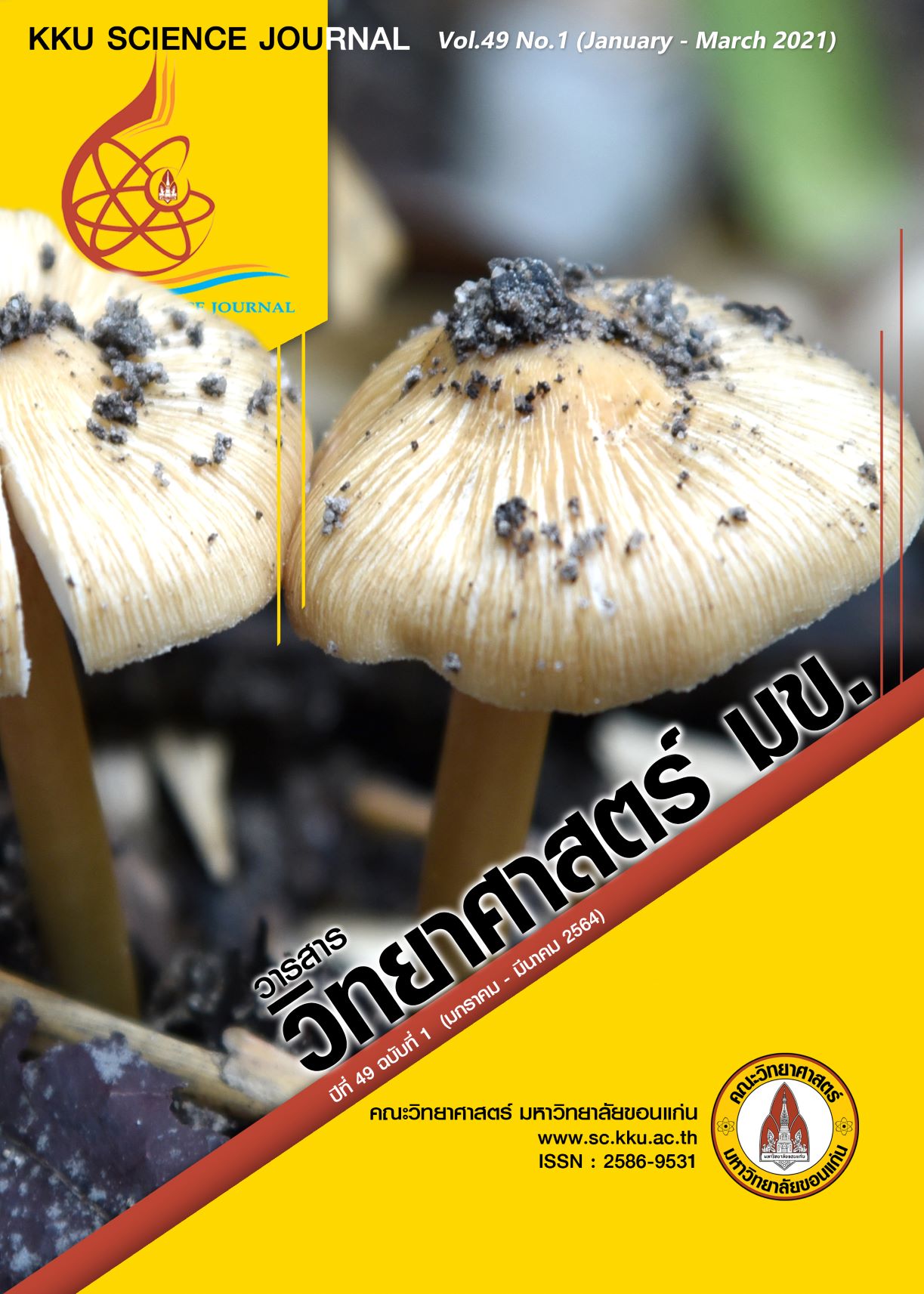Diagame: A Fun Application for Improving Logical Thinking
Main Article Content
Abstract
Logical thinking is an important foundational skill of programming. The purposes of this research were to develop an application for improved systematic and logical thinking using gamification concepts and to evaluate the effectiveness of this application by using a questionnaire for assessing user satisfaction. The design of the application was based on a concept of mission-based game such as a timer, score, badge, and leaderboard to make it interesting. Furthermore, lessons were divided into stages, and each stage was progressively harder than its predecessor. This application was developed as a web application by using Node.js and Google Cloud Firestore. A questionnaire in five scales was used to evaluate the effectiveness of the applications. The sample group used for testing was a group of 131 freshmen students in software engineering program. The results showed that the average user satisfaction of the application version 2, in 2020, was 4.24 (S.D. = 0.93), higher than that of the application version 1, in 2019, 3.70 (S.D. = 1.02). Therefore, the evaluation results indicate that the current application quality was improved compared with the previous application quality. The application version 2 was improved in the backend and frontend parts. In the backend, the administrator can manage the questions and answers of lessons and adjust difficult levels of questions. There is a dashboard of usage statistics. In the frontend, the application displays a tutorial to users in the first game. During playing game, users can view the score values and send the feedbacks to the administrator.
Article Details

This work is licensed under a Creative Commons Attribution-NonCommercial-NoDerivatives 4.0 International License.
References
ชนัตถ์ พูนเดช และธนิดา เลิศพรกุลรัตน์. (2559). แนวทางการจัดการเรียนรู้ด้วยแนวคิดเกมมิฟิเคชัน. วารสารศึกษาศาสตร์มหาวิทยาลัยนเรศวร 18(3): 331-339.
บัญญพนต์ พูลสวัสดิ์ และพนมพร ดอกประโคน. (2559). เกมบนโปรแกรมเชิงจินตภาพและแนวคิดเชิงคํานวณอย่างเป็นระบบ. Journal of Information Science and Technology 6(2): 9-16.
เบญจภัค จงหมื่นไวย์ กริช กองศรีมา แสงเพ็ชร พระฉาย สายสุนีย์ จับโจร และอรัญ ซุยกระเดื่อง. (2561). เกมมิฟิเคชันเพื่อการเรียนรู้. วารสารโครงงานวิทยาการคอมพิวเตอร์และเทคโนโลยีสารสนเทศ 4(2): 34-43.
เบญจวรรณ ถนอมชยธวัช ผ่องศรี วาณิชย์ศุภวงศ์ วุฒิชัย เนียมเทศ และณัฐวิทย์ พจนตันติ. (2559). ทักษะแห่งศตวรรษที่ 21: ความท้าทายในการพัฒนานักศึกษา. วารสารเครือข่ายวิทยาลัยพยาบาลและการสาธารณสุขภาคใต้ 3(2): 208-222.
ผุสดี บุญรอด และประกายมาศ ศรีสุขทักษิณ. (2558). การค้นคืนข้อมูลขนาดใหญ่โดยใช้ภาษาสอบถามแบบไม่มีโครงสร้างร่วมกับเทคโนโลยีเว็บเชิงความหมาย. วารสารวิชาการพระจอมเกล้าพระนครเหนือ 25(2): 255-264.
ภาสกร เรืองรอง รุจโรจน์ แก้วอุไร ศศิธร นาม่วงอ่อน อพัชชา ช้างขวัญยืน และศุภสิทธิ์ เต็งคิว. (2561). Computational Thinking กับการศึกษาไทย. วารสารปัญญาภิวัฒน์ 10(3): 322-330.
ศูนย์ดําเนินงาน PISA แห่งชาติสถาบันส่งเสริมการสอนวิทยาศาสตร์และเทคโนโลยี. (2562). ผลการประเมิน PISA 2018 : บทสรุปสําหรับผู้บริหาร. สถาบันส่งเสริมการสอนวิทยาศาสตร์และเทคโนโลยี (สสวท.). หน้า 1-9.
สํานักงานเลขาธิการสภาการศึกษา. (2560). แผนการศึกษาแห่งชาติ พ.ศ. ๒๕๖๐ - ๒๕๗๙. กรุงเทพฯ: บริษัทพริกหวานกราฟฟิคจํากัด. หน้า 75-92.
สํานักนายกรัฐมนตรี สํานักงานคณะกรรมการพัฒนาการเศรษฐกิจและสังคมแห่งชาติ. (2559). แผนพัฒนาเศรษฐกิจและสังคมแห่งชาติฉบับที่สิบสองพ.ศ. ๒๕๖๐ - ๒๕๖๔. กรุงเทพฯ: ม.ป.พ. หน้า 63-64.
Agarwal, S. A. (2013). Data Mining: Data Mining Concepts and Techniques. In: 2013 International Conference on Machine Intelligence and Research Advancement. Katra. India. 203-207.
Anwar, A. M., and Naseer, A. (2012). Information Mining in Assessment Data of Students’ Performance. International Journal of Engineering Science and Innovative Technology (IJESIT) 1(2): 207-212.
Buchanan, G., and Tashakkori, R. (2019). A Web-App for Analysis of Honey Bee Hive Data. In: 2019 SoutheastCon. Huntsville, AL, USA. 1-6.
Carter, B. (2014). HTML Educational Node.js System (HENS) An applied system for web development. In: 2014 Annual Global Online Conference on Information and Computer Technology. Louisville, KY, USA. 27-31.
Chitra, L. P., and Satapathy, R. (2017). Performance comparison and evaluation of Node.js and traditional web server (IIS). In: 2017 International Conference on Algorithms, Methodology, Models and Applications in Emerging Technologies (ICAMMAET). Chennai, India. 1-4.
Ferianda, M. R., Herdiani, A., and Sardi, I. L. (2018). Increasing Students Interaction in Distance Education Using Gamification. In: 6th International Conference on Information and Communication Technology (ICoICT). Bandung, Indonesia. 125-129.
Google, LLC. (2020). Cloud Firestore. แหล่งข้อมูล: https://firebase.google.com/docs/firestore. ค้นเมื่อวันที่ 10 ตุลาคม 2563.
Ivanova, G., Kozov, V., and Zlatarov, P. (2019). Gamification in Software Engineering Education. In: 2019 42nd International Convention on Information and Communication Technology, Electronics and Microelectronics (MIPRO). Croatia. 1445-1450.
Kiget, N. K., Wanyembi, G., and Peters, A. I. (2014). Evaluating Usability of E-Learning Systems in Universities. International Journal of Advanced Computer Science and Applications 5(8): 97-102.
Lotlikar, P., Pathak, D., Herold, P. C., and Dasgupta, C. (2020). Tangible Flowchart Blocks for Fostering Logical Thinking in Visually Impaired Learners. In: 2020 IEEE 20th International Conference on Advanced Learning Technologies (ICALT). Tartu, Estonia. 266-268.
Malizia, A., Fogli, D., Danesi, F., Turchi, T., and Bell, D. (2017). TAPASPlay: A game-based learning approach to foster computation thinking skills. In: 2017 IEEE Symposium on Visual Languages and Human-Centric Computing (VL/HCC). Raleigh, NC, USA. 345-346.
Mi, Q., Keung, J., Mei, X., Xiao, Y., and Chan, W. K. (2018). A Gamification Technique for Motivating Students to Learn Code Readability in Software Engineering. In: International Symposium on Educational Technology. Osaka, Japan. 250-254.
Ming-Syan, C., Jiawei, H., and Philip, S. Yu. (1996). Data mining: an overview from a database perspective. IEEE Transactions on Knowledge and Data Engineering 8(6): 866 - 883.
Nurhudatiana, A., Hiu, A. N., and Ce, W. (2018). Should I Use Laptop or Smartphone? a Usability Study on an Online Learning Application. In: 2018 International Conference on Information Management and Technology (ICIMTech). Jakarta, Indonesia. 565-570.
OpenJS Foundation. (n.d.). Node.js. แหล่งข้อมูล: https://nodejs.org/en ค้นเมื่อวันที่ 15 ตุลาคม 2563.
Papadopoulos, I., Kogias, D., Patrikakis, C., and Marinou, C. (2017). Enhancing the student's logical thinking with Gherkin language. In: 2017 IEEE Global Engineering Education Conference(EDUCON). Athens, Greece. 1543-1547.
Pessoa, M., Alencar, L. F., Araújo, L., Melo, R., and Pires, F. (2019). Looking for Pets: a game for the logical reasoning development. In: 2019 IEEE Frontiers in Education Conference (FIE). KY, USA. 1-4.
Pianprasit, P., Seesai, P., and Rimcharoen, S. (2017). Association Rule Mining for Analyzing Placement Test of Computer Science Students. In: 2017 2nd International Conference on Information Technology (INCIT). Nakhonpathom, Thailand. 1-5.
Shah, H., and Soomro, T. R. (2017). Node.js Challenges in Implementation. Global Journal of Computer Science and Technology: ENetwork, Web & Security 17(2): 73-83.
Zafar, R., Yafi, E., Zuhairi, M. F., and Dao, H. (2016). Big Data: The NoSQL and RDBMS review. In: 2016 International Conference on Information and Communication Technology (ICICTM). Kuala Lumpur, Malaysia. 120-126.


